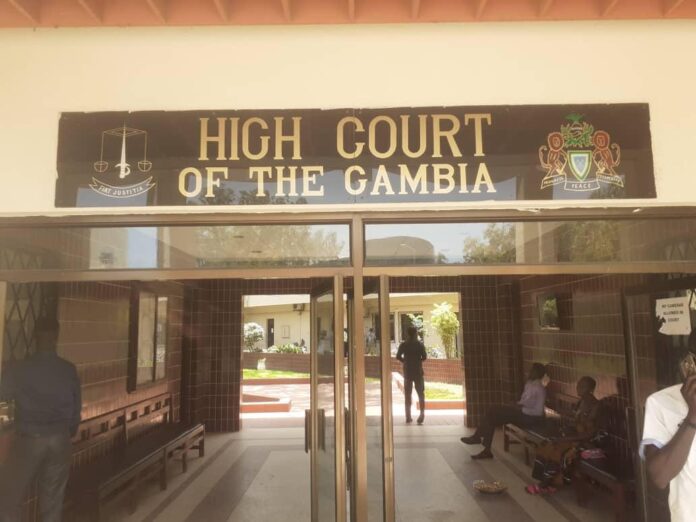By Mariama Marong
The trial of Omar Fraser, accused of murdering Kebba Ndoye, commenced on Wednesday, 10th July 2025, before Justice Sidi Jobarteh at the High Court in Banjul, with two police officers called as the prosecution’s first witnesses.
The accused, Omar Fraser, is charged with a single count of murder, contrary to section 187 of the Criminal Code. The particulars of offence allege that on the 4th of October 2023, between 6:00 a.m. and 6:15 a.m., at Old Perseverance Street in Banjul, Fraser stabbed the deceased, Kebba Ndoye, on the neck with a broken bottle, causing his death with malice aforethought.
The prosecution is represented by Counsel H. Drammeh, while the accused is defended by Lawyer Pa Harry Jammeh.
Taking the stand as the first witness was ASP Momodou Sowe, a police officer stationed at Police Headquarters in Banjul. He told the court that on 4th October 2023, around 7:00 p.m., they received a report of a crime scene in the Perseverance area of Banjul.
“Upon our arrival at the scene, we observed bloodstains at different spots. We collected them as evidence,” ASP Sowe said. “We also found broken bottle glasses and a broken white plastic chair.”
These items were brought before the court and tendered by State Counsel H. Drammeh without objection from the defence. Justice Jobarteh admitted them into evidence and marked them as exhibits.
When asked by State Counsel if he knew the cause of the incident, ASP Sowe replied, “After we secured the scene and gathered our evidence, we proceeded to the accused person’s compound because it was a murder case.”
He added, “When we reached the accused person’s compound, we found blood stains in the corridor and in the house of the accused as well.”
During cross-examination, defence lawyer Pa Harry Jammeh asked the witness if he knew where the body of the deceased was at the time. Sowe responded, “I did not know where the body was because that is not my job as a forensic officer.”
“My job was to follow and track the blood, which helps me in collecting evidence and documenting the crime scene,” he continued. “But I don’t personally witness how the victim died.”
Counsel Jammeh further asked whether the witness could identify the accused’s fingerprints on the broken glass allegedly used in the attack.
Sowe answered, “No. I cannot identify the fingerprints of the accused on the glass because it was broken.”
The second prosecution witness, Inspector Ousman Sonko, also took the stand. He informed the court that he recognized the accused and was involved in the process of apprehending him after the alleged crime.
“We were informed that the accused fled to a village in Senegal called Kerr Ayib, which is not far from Farafenni,” Inspector Sonko said.
He testified that he was stationed at Farafenni Police Station when he received a call from an informant about the accused.
“With the help of the Senegalese military, we were able to bring back the accused from Kerr Ayid,” the inspector told the court.
Sonko said that upon returning from the Senegal-Gambia border, he obtained a cautionary statement from the accused in the presence of an independent witness.
However, when State Counsel Drammeh attempted to tender the cautionary statement into evidence, defence lawyer Jammeh objected, claiming the statement was not voluntarily made.
He argued, “The accused was forcibly beaten while the statement was being obtained. He was not in a stable state of mind at the time.”
Inspector Sonko disagreed. “The accused person was in his rightful sense when I obtained the statement in the presence of an independent witness,” he told the court.
Justice Jobarteh subsequently adjourned the matter to 22nd July 2025 for a mini trial to determine the admissibility of the cautionary statement. This will help the court to understand whether the accused person was forced to give the statement.
The trial continues.
















